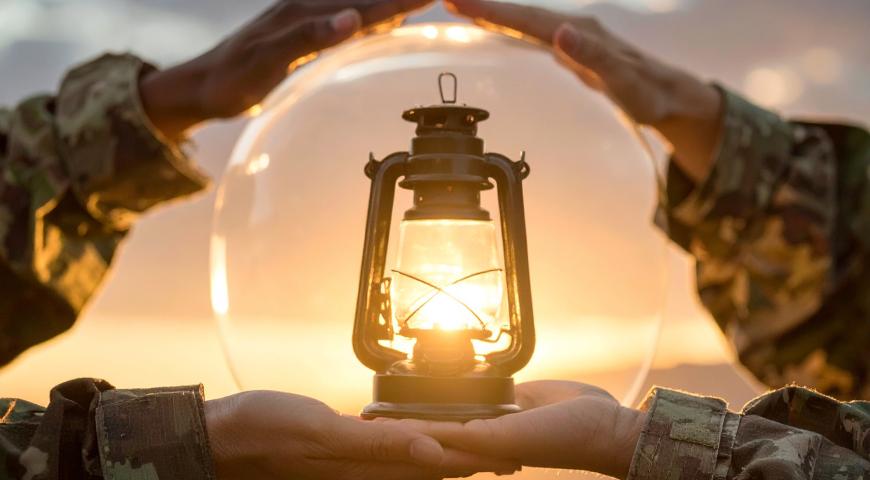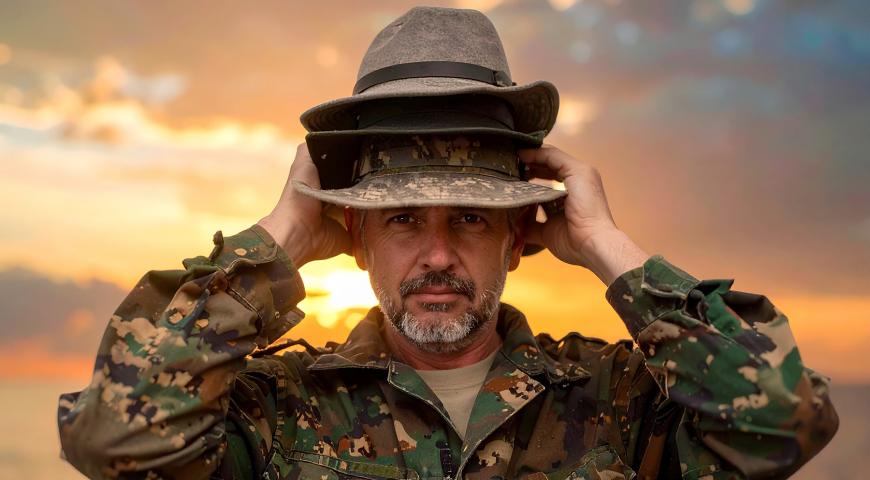Finding Virtue In Violence Or Writing For A Moral Compass In The 21st Century
LTCOL Thomas McDermott
‘For we know enough, if we know we are the king’s subjects; if his cause be wrong, our obedience to the king wipes the crime out of us'.
Bates, a soldier, to a disguised King Henry V, Act IV, Scene 1 [1]
Everyone over the age of twenty-five has their 9/11 story. Mine is about a forgotten moral compass, and the search for a new one through writing. When the attacks happened I was a young Officer Cadet in the British Army, training at the Royal Military Academy. On the morning of September 11 th 2001 we were timetabled for a defence studies lecture entitled ‘The Causes of War’. Instead we woke to a city, and a world, on fire. As good cadets we dutifully trudged up for our lecture, more worries about breaking the timetable than of world events. The experienced historian (noting the irony of his topic against the unfolding attack) told us to go away and watch television. He said it would be instructive.
So we sat together as a young cohort in the Academy mess hall, and we watched. We didn’t see the planes come in but we saw with detached shock as the towers collapsed. We knew that thousands would be dead. If I’m honest the first emotion I remember after the shock was excitement. Even at our young age we knew there would be a military response. As one of America’s closest allies we knew the British would be involved. We knew we would be part of it … we just didn’t know when.
Iraq, Ethics and our Obedience to the King
Five hundred and fifty four days later, as a lieutenant in an armoured battlegroup, I took part in the invasion of Iraq. While you can split hairs about counterfactuals and flawed intelligence, it is now formally agreed (at least in the UK [2] ) that the decision to overthrow Saddam was not an action of last resort, and that it triggered a chain reaction with tragic results. The big picture outcome, however, isn’t what I want to talk about. Instead I want to narrow down to the micro; to reflect on my own personal consideration of the ethics of the invasion at the time. Did I, as a young combat officer serving a democratic country, consider the invasion of Iraq to be ‘right’? Were the Iraqis my enemies, and a threat to my way of life? Above all, was killing them OK … and how much responsibility did I hold if it all went wrong?
I look back with a sense of curiosity as to how little I considered these questions, nor the morality of the war I was about to fight. I don’t recall any real process of moral reflection. The intelligence seemed so sound, and the Prime Minister so confident. Saddam Hussein was the villain of our era, and getting rid of him was the ‘right thing to do’. [3] I had seen the videos of the Iraqi chemical attacks on Halabja, and the images of dead children were imprinted on my mind. But, if I’m honest, all of this faded into the background compared to my own professional desire to go to war. I wanted to fight: to do the job I had aspired to do since I was a teenager. I thought little, if at all, about what would follow after we deposed Saddam. The importance of a just peace (jus post bellum), and our moral responsibility for the aftermath of what we did, didn’t even register against my zeal for soldiering. The fight was all.
This lack of moral consideration surprises me even today. It wasn’t like I lacked the intellectual wit to consider it. I had grown up in a home full of traditional Christian values. I had studied English literature and then Classics at a good university. I had devoured the Iliad and the Odyssey, and had spent many hours debating fate, free-will and the just cause of the Achaeans. I had read Thucydides, Plato, Aristotle. I could quote from war epics like King Henry the Fifth. But all of this education faded when faced with the excitement of a real, conventional war. When thinking of Iraq, I was all ‘St Crispin’s Day Speech’ from Henry V. I believed I was one of the ‘happy few’, the ‘band of brothers’, and that those who did not deploy to Iraq would ‘think themselves accurs’d they were not here’. [4] Never did I consider that, like Bates in the opening quote, I should worry of my personal responsibility if it proved that the ‘King’ was wrong. It seemed I had learned the theory of morality, but I failed to put it in practice. It wasn’t so much that I lacked a moral compass - I had just forgotten it. I never even realised.
Afghanistan, the All-Seeing Eye and a Moral Realisation
Seven years later I was fighting the same war, but this time in Afghanistan. Our declared enemy remained ‘terror’; as undefined an opponent as you could ask for, and one that Sir Hew Strachan has since labelled as ‘profoundly astrategic’. [5] But while the war was the same, the style of warfare had changed dramatically. 2010 saw not only the height of the US surge but also the pinnacle of our ability to apply technologically-enabled violence. A vast array of sensors, listening devices, drones and aircraft criss-crossed Afghanistan. It created unparalleled access – an all-seeing eye – into the lives of the Afghan people. Ultimately however it had one purpose: to create the lowest risk and most precise capture / kill machine in human history.
For six months I was part of a team that used this eye to find, follow and (often) kill insurgents from afar. It was a surprisingly intimate process. We would watch commanders for hours, days and weeks on end, never leaving the safety of a secure operations room. Once an individual of interest was located, the aim was to always know where they were … rotating assets, staying focussed and never allowing a ‘blink’ in the eye. When we were sure, and if the moment and rules of engagement were right, we would strike. It was designed to be clean, clinical. The target would know nothing before the explosion - bar perhaps the subconscious realisation of the faintest hiss as a missile left the rail from a drone or helicopter some kilometres away. We were the quiet, surgical high-tech snipers of the modern age, and about as far away as possible from the overwhelming force delivered in the invasion of Iraq. Morally it should have felt infinitely more proportionate, more discriminate, and therefore better.
It didn’t. The clinical nature of the ‘machine’ was somehow harder to morally square than the visceral experience of Iraq. It was perhaps ironic that the last time I had watched live death through television was on 9/11. Isolated from the actual violence being applied, I could feel myself becoming increasingly detached from the strikes. They became commonplace, a process to be followed: guided by targeting lists, flowcharts and rules of engagement. The life at the other end gradually lost some of its meaning. Worse, it was easy to get caught up in the thrill and challenge of the game: rotating assets, avoiding the ‘blink’, setting conditions, achieving a strike. It was exciting, and entirely free of personal risk.
Older, a little wiser and more experienced than in Iraq, I began to turn a critical eye to my own moral perception of my actions. I was by this time a committed professional soldier, and no pacifist. I firmly believed that killing in war was necessary and justified. But it could never, and should never, be free of moral cost. I realised that Bates was wrong. It was not enough just to know I was one of the King’s subjects. I could not believe that obedience could wipe my moral responsibility for my own actions, somehow deferring them to the State. I began to reconsider and rediscover my moral compass. I returned to theory, studying philosophy and the morality of political violence. I delved into the two-thousand year history of the traditions of just war, reading the works of moral philosophers like Aristotle, Jeremy Bentham, Immanuel Kant, John Stuart Mill and Michael Waltzer. Critically I started to write down my experiences, stripped of secrets, to help me to understand my own cardinal points. I realised that, through study and writing, I could armour myself with a framework of theory that would allow me to square my own moral responsibility for fighting. This ethical armour, I hoped, would protect me from the slippery slope into the atrocity of killing without purpose.
In 2013 I returned to Afghanistan, this time with the responsibility of squadron command. I was determined that the soldiers in my care should not find themselves in the personal moral place that I had found myself in Iraq and Afghanistan. Yes, I wanted them to be able to kill.However I also wanted them to be able to understand the ethical challenge killing would present. I needed each of them to be able to square their own moral circle: to be able to look at themselves in the mirror ten years down the line and be spiritually content with what they had done. So I taught them ethics, and I wrote it down for them. I tried to give them the same theoretical armour I had constructed for myself. Each soldier had to find their own answers, but I tried to give them a framework to consider the problem. Deep down, I think it worked. As a unit we held a tight line on the use of force. We killed, but we did so with caution and consideration. We guarded ourselves against the heady excitement of war. We avoided the slippery slope to barbarism. I like to think, as a group, we will look back on that time and be content with what we did.
Moral Lessons and the Value of the Written Word
‘We have learned in the agony of war that great power involves great responsibility.’
From a speech written by Franklin D. Roosevelt the night before his death [6]
In December 2014, not long after my departure from Helmand Province, the international mission in Afghanistan ceased. This placed a marker in the sand for the wars that were a direct result of the 9/11 attacks. The Obama Administration was clear that the so-called Global War on Terror (a war without geographical boundary and targeting an emotion) was over. I therefore had the dubious honour of being one of those who were both present at the declaration, and then part of the cessation. For fourteen years we had fought persistent, irregular and broadly unpopular wars. Tens of thousands were dead. But there had not been another 9/11, and for a brief moment it seemed like the armies of the West might be gifted with a dividend of time for introspection. I returned to the UK to teach at the Joint Services Command and Staff College. On the back of a successful tour, my ethical concerns faded into the background of a new role and a glorious summer.
Then the Islamic State raged across Iraq and Syria, and all thoughts of a peace dividend disappeared in a field of black flags and beheadings. The next phase of what was clearly now a generational struggle against extremism began. Those of us teaching at the Staff College, who represented the generation that had fought the first phase, realised that the lessons learned over fourteen bloody years were rapidly being left behind. We envisaged a new generation of soldiers and officers about to go through the ethical fires of irregular conflict. They would receive intoxicating power, and thus great responsibility, and we didn’t want them to make the same mistakes we had. The solution, we thought, might lie in the written word. So, along with a colleague who believed as I did, we began to write. There was no better place to do this than at the Staff College. Not two buildings away we found a real life moral philosopher, a doctor of military ethics, who helped us distil our scattered thoughts into a simple and coherent model. We discussed theories and drafts with students and staff. Together the three of us dragged ethical theory down into the muck, using real life scenarios to relate complex concepts like deontology and consequentialism to the battlefield. And you know what? It worked. Soldiers read it. Students at the College discussed it. Copies were passed around. Eventually the work was named ‘Armouring Against Atrocity’ and published in a book on leadership and ethics in war; an enduring record of hard-earned lessons on morality in modern conflict. [7] This record, no matter what, will now never be lost.
Conclusion: The Enduring Power of the Writing
For the first ten years of my military career and through the bulk of two wars I was broadly unaware of my moral compass. It is to the credit of the virtue ethics of the British Army that, even without such self-awareness, I still remained on the straight and narrow. The study of ethical theory helped me to rediscover what I was missing, and I was then able to better armour both myself and those in my charge against the corruptions of war. It was the written word, however, that helped me to help others to see the inherent moral risks of combat. Through collaboration in prose and narrative we were able to illuminate the darker corners of modern war.
Observing the potential power of the words I had written was a watershed moment for me. I realised that writing could give enduring life to the ripples of my experience. It not only helped me to reflect on my own behaviour and explore new ideas, but it allowed me to share them with others who were about to enter difficult times. I don’t write for pleasure, or for fiction. I don’t find writing easy; I agree with Ernest Hemingway, who is reported to have said ‘there is nothing to writing … all you do is sit down at a typewriter and bleed’. [8] But there is nothing that matches the capacity of the written word in driving meaningful and positive change, and this is why I continue to force myself to write. Increasingly, however, I am realising that you don’t have to bleed alone. No experience is truly unique, and in our interconnected world there is almost always someone who feels as you do. All you need to do is reach out and find them.
[1] William Shakespeare, ‘King Henry the Fifth’, The Complete Works of William Shakespeare (Hertfordshire:Wordsworth Editions Limited, 1996), Act IV, Scene 1, lines 1975 - 1980.
[2]Between 2009 and 2016 the UK Government held the exhaustive Iraq Inquiry, led by Sir John Chilcot. Its final report, published in 2016, concluded that ‘military action was not a last resort’. See Iraq Inquiry, Report of the Iraq Inquiry, Executive Summary, para 20 found at link (accessed 20 Jan 18).
[3] In July 2002 Tony Blair wrote to President Bush outlining the next steps on Iraq. He famously started this note with the words ‘I will be with you, whatever’. In the note, Blair states that ‘getting rid of Saddam is the right thing to do’. See Note Blair to Bush, ‘Note on Iraq’, 28 Jul 2002, from Iraq Inquiry evidence found at link (accessed 20 Jan 18).
[4] Shakespeare, ‘King Henry the Fifth’, Act IV, Scene 3, lines 2255 – 2305.
[5] Hew Strachan, Direction of War: Contemporary Strategy in Historical Perspective (Cambridge: Cambridge University Press, 2013), p. 64.
[6] Franklin D. Roosevelt: ‘Undelivered Address Prepared for Jefferson Day’, April 13, 1945. Online by Gerhard Peters and John T. Woolley, The American Presidency Project found at https://www.presidency.ucsb.edu/documents/undelivered-address-prepared-for-jefferson-day(accessed 20 Jan 18).
[7] Thomas McDermott and Steve Hart, ‘Armouring Against Atrocity: Developing Ethical Strength in Small Military Units’, Military Ethics and Leadership (Leiden: Brill, 2017), pp. 16 – 55.
[8] There is no real evidence that Hemingway said this. It has been variously attributed to Friedrich Nietzsche, to American fiction writer Thomas Wolfe, to sport columnist Walter Wellesley ‘Red’ Smith, and to Paul Gallico (the author of The Poseidon Adventure). Whatever the true provenance, the phrase rings true.
Technical Mastery
Social Mastery
Please let us know if you have discovered an issue with the content on this page.
Comments
Start the conversation by sharing your thoughts! Please login to comment. If you don't yet have an account registration is quick and easy.




